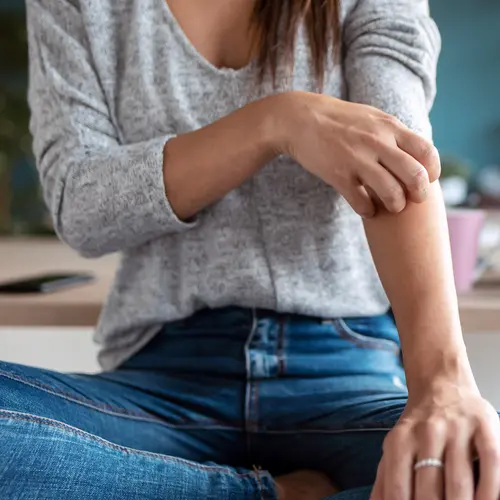Dating in itself can be tricky. But if you have a skin condition like psoriasis, you might feel as though there are extra hurdles to overcome while you meet new people. Studies have shown that some people with psoriasis have a lower quality of life. The condition can also affect your sexual health.
But there are many things you can do to avoid or reduce self-doubt when it comes to dating with psoriasis.
How to Talk About Psoriasis While Dating
Communication is important in all relationships. When dating, it’s always helpful to be straightforward with your concerns. But it might take some time to be comfortable enough to express your feelings, especially those about your psoriasis.
When you feel ready, start a conversation with your partner about your skin condition. Bring up specific topics that are important to you. You may want to:
Educate them. The person you’re dating may not know anything about psoriasis. In fact, you may be the first person they’ve dated who has it. Explain to them what psoriasis is and how it affects you. Be prepared to answer questions they may have.
Shut down any misbeliefs. Your partner may not know much about psoriasis. They may have some untrue beliefs about what the skin condition actually is. One study found that more than 62% of people surveyed had a lack of information about psoriasis. Almost 20% of people had some misconceptions about it. Many of these people also believed false information about psoriasis and physical touch (including sex).
Remind them that psoriasis isn’t contagious. They can’t get it from being in contact with you. Let them know the true science behind the condition. It doesn’t happen because of bad hygiene.
Although they may have false beliefs about psoriasis, chances are they don’t mean any harm. Confront ignorance with an understanding and positive mindset. This can help them learn the truth about your condition. And it can allow you to connect better with your partner.
Be honest. It’s OK to be vulnerable with your feelings about your psoriasis. Talk to the person you’re dating and let them know how you truly feel. This can help them grasp how psoriasis impacts you emotionally.
If you see a potential future with this person, it’s especially important that they understand you. It’s better to be upfront with your feelings, rather than hold them in. If you plan to continue a relationship with them, they should understand the role psoriasis plays in your life.
Prepare for intimacy. Before you and your partner decide to have sex or become intimate, you may want to chat about your psoriasis. If you have psoriasis on your genital area or groin, it may be a good idea to assure your partner of a few things:
- Make sure they understand that it’s not contagious or sexually transmitted.
- Let them know that sex could irritate your psoriasis. But that doesn’t mean you can’t have sex. Explain to your partner that it’s safe for you to be intimate.
If sex does become painful with psoriasis, there are some things you can do to stay comfortable:
- Use lubrication to lessen friction on your skin. Test different ones before you use it during sex. This will help make sure it doesn’t trigger your psoriasis.
- Condoms can also lower friction. And they can be helpful during sex if your or your partner’s penis has psoriasis on it.
- Make sure to keep up with your psoriasis treatment plan. Treatment can help manage your symptoms and lessen the visible effects of psoriasis. If you stay on top of your plan, you may not have as many flares.
Remember that genital psoriasis is very common. It’s nothing to be embarrassed or ashamed about. Around two-thirds of people with the skin condition will have genital psoriasis at some time in their lives.
How to Handle Negativity About Psoriasis
No matter how well you educate and explain your skin condition to others, some people may still be ignorant. When dating, negative reactions from others can be hard to navigate.
With newer relationships or casual sex especially, a person may withdraw or have a hurtful reaction when you tell them about your psoriasis. But in other cases, your partner may not worry at all.
It’s important to be prepared for either reaction. But remember that one person’s ignorance shouldn't define your self-worth. They may not understand your skin condition, and their reaction may be based on a lack of education. Surround yourself with kind and thoughtful people who will take time to learn about every part of you, including your psoriasis.
Resources for Dating With Psoriasis
You can always talk to your doctor if you have concerns about dating and psoriasis. But you may also want advice from peers who’ve gone through similar situations. There are many resources that you can use, such as:
Guides. Many psoriasis organizations have guides on how to navigate relationships and psoriasis. Check out groups like the Psoriasis Association or the National Psoriasis Foundation.
Peer advice programs. You can look into groups, such as the National Psoriasis Foundation’s “One to One” program or the Psoriasis Foundation’s Facebook groups and online forums. Through these, you can connect with mentors who will share tips on dating, sex, relationships, and more with psoriasis.
Events near you. If you want to connect with others in person, the National Psoriasis Foundation also has live events in many states. There, you can connect with people who have psoriasis. They can share tips and advice for dating with the skin condition.

